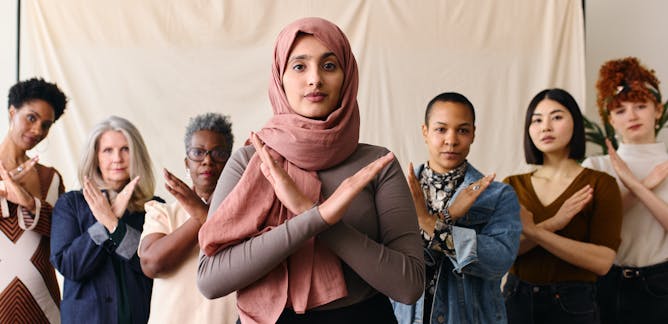|
Next Friday is International Women’s Day. March 8 is “a global day celebrating the social, economic, cultural, and political achievements of women. The day also marks a call to action for accelerating women's equality.” The history of International Women’s Day goes back to the early 20th century. It was first celebrated in 1911. Over the years, The Conversation has published many stories about International
Women’s Day and we have more planned for this week.
Since The Conversation Canada launched in 2017, we have been tracking the gender of our authors. One of the reasons we did this was because of an initiative by Informed Opinions, a Canadian charity whose mission is to amplify “the voices of women and gender-diverse people to ensure their experiences, ideas and insights help shape a more equitable, inclusive and democratic Canada.” (Full transparency: I sit on the
board of Informed Opinions.)
Informed Opinions has challenged Canadian media outlets to measure how many women’s voices were reflected in their stories. Ongoing research by the charity suggests that women make up only about 31 per cent of the sources quoted by journalists. Since we began tracking the gender of our own authors, we have seen an almost even split between men and women – and in some years, we have slightly more female authors.
To mark International Women’s Day this week, I have assembled some recent and archived articles from the global network of The Conversation that look at some still-ongoing problems of gender inequality.
Have a great weekend. We’ll be back in your Inbox on Monday.
|
Celebrating International Women's Day
|

Shannan M. Grant, Mount Saint Vincent University; Barb Hamilton-Hinch, Dalhousie University; Dayna Lee-Baggley, Dalhousie University; Jacquie Gahagan, Mount Saint Vincent University; Jessica Mannette, Saint Mary’s University; Leigh-Ann MacFarlane, Mount Saint Vincent University
Acknowledging that factors like the built environment, social and health systems, and outdated policies are the problems — rather than people — is a step towards healthier and safer workplaces.
| |

Tina Fetner, McMaster University
Research shows that feminist women are more likely to have sex that is more loving and pleasurable.
|

Diane Williams, McDaniel College
Before being pushed aside by the NCAA, the AIAW, which was designed for and by women, governed women’s college athletics.
| |

Elizabeth Goodyear-Grant, Queen's University, Ontario
Days of international observance recognize challenges facing marginalized groups or society as a whole, draw attention to them and create unity and mobilization around those problems.
|

Bronwen Dalton, University of Technology Sydney; Kyungja Jung, University of Technology Sydney; Lesley Parker, University of Technology Sydney
Through acts of covert resistance, women have been driving change in family relationships, women’s sexuality and reproductive issues, and women’s cultural identities.
| |

Aífe Hopkins-Doyle, University of Surrey; Aino Lilja Petterson, University of Oslo; Robbie Sutton, University of Kent
Feminists are about as man-hating as men are.
|
|
|

Fritz Holznagel, The Conversation
Test your knowledge with a weekly quiz drawn from some of our favorite stories.
|

Gemma Ware, The Conversation
Daryl Van Tongeren explains what it means to be intellectually humble, and why it’s so important right now on The Conversation Weekly podcast.
|